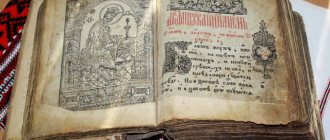Psalms, Psalm 144
In Israel, as in neighboring countries - Egypt, Mesopotamia, Canaan - lyric poetry has always flourished. Its examples are found in many historical books, for example, the song of Moses (Exodus 15), the song of the well (Numbers 21:17-18), the victory hymn of Deborah (Judgment 5), David's lament for Saul and Jonathan (2 Samuel 1), songs of praise to Judas and Simon the Maccabees (1 Macc 3:3-9 and 1 Mac 14:4-15). And in the NT there are songs: “My soul magnifies the Lord,” “Blessed is God,” and “Now you let go.” Many fragments of prophetic books and ancient extra-biblical collections belong to the same type of literature, from which only titles and small fragments have come down to us: the book of the Armor of Yahweh (Numbers 21:14) and the book of the Righteous (Joshua 10:13; 2 Kings 1: 18). The Psalter has preserved for us a true treasure of religious poetry in Israel.
The Psalter (from the Greek “ψαλτηριον” - lit., a string instrument reminiscent of our harp or harp, to the accompaniment of which chants were sung) is a collection of 150 psalms. Greek The Psalter contains 151 psalms, and the Syriac translation has 155. Recent discoveries at the Dead Sea have made it possible to reconstruct Heb. original Ps 151 and the last two Syriac psalms.
From Ps 9 to Ps 148, the numbering of the LXX and Vulgas (which we follow here) is one unit behind the numbering of the Hebrew. The Bible in which Ps 9 and Ps 113 are divided into two, and Ps 114 and Ps 115 and Ps 146 and Ps 147 are combined. In Hebrew The Psalter is called “tehillim”, i.e. songs of praise. Individual psalms are most often entitled "mizmor", which indicates musical accompaniment; some psalms are called songs, for example, “Songs of Ascension” (Ps 120-134).
Contents of the Psalter
The reasons that inspire the psalmist are varied: historical events; the vicissitudes of personal life that direct a person to a single source of hope; the longing for God of a soul imbued with repentance, its gratitude to the inexhaustible goodness of God, its delight before the greatness of the Creator, His omnipotence and wisdom, before the perfection of His creation. And these quiet sighs and triumphant praises either sound as if in cell solitude, or are picked up by the choir of the praying people. And over all this yearning for God, over all personal and national everyday sorrow and spiritual joy, one cherished thought, one impatient expectation dominates - the Messiah to come, at the thought of Whom the spirit of the psalmist is filled with prophetic power.
Analysis of the semantic content allows us to establish that the main themes of the chants were:
a) historical events of national life - in the psalms Ps 43, Ps 59, Ps 73, Ps 78, Ps 83, Ps 84, Ps 107, Ps 122, Ps 124, Ps 125, Ps 143; - Ps 47, Ps 64, Ps 117, Ps 123, Ps 128, Ps 136: - Ps 19, Ps 20, Ps 60;
b) tests of personal life - in the psalms Ps 3, Ps 4, Ps 7, Ps 9, Ps 10, Ps 11, Ps 12, Ps 13, Ps 16, Ps 24, Ps 25, Ps 27, Ps 29, Ps 30, Ps 34, Ps 38, Ps 40, Ps 52, Ps 53, Ps 55, Ps 58, Ps 63, Ps 68, Ps 69, Ps 70, Ps 85, Ps 87, Ps 89, Ps 108, Ps 113, Ps 114 , Ps 115, Ps 119, Ps 120, Ps 130, Ps 139, Ps 140;
c) contrition for the sin committed - in the psalms Ps 6, Ps 31, Ps 37, Ps 50, Ps 101, Ps 129, Ps 142, called “repentant”;
d) an abundance of gratitude to God and praise - in the psalms Ps 8, Ps 18, Ps 28, Ps 32, Ps 65, Ps 74, Ps 75, Ps 80, Ps 90, Ps 91, Ps 94, Ps 99, Ps 102, Ps 103, Ps 110, Ps 112, Ps 116, Ps 126, Ps 133, Ps 134, Ps 137, Ps 138, Ps 144, Ps 145, Ps 147, Ps 148, Ps 149, Ps 150, Ps 151;
e) longing for God and zeal for His glory - in the psalms Ps 41, Ps 42, Ps 47, Ps 62, Ps 83, Ps 113, Ps 121, Ps 134;
f) contemplation of the ways of good and evil and the fate of the righteous and the unrighteous - in Psalms Ps 14, Ps 23, Ps 81, Ps 100, Ps 118; - Ps 36, Ps 48, Ps 51, Ps 57, Ps 72; Ps 39, Ps 49; - Ps 1, Ps 22, Ps 26, Ps 33, Ps 35, Ps 61, Ps 111, Ps 127, Ps 132;
g) the promises and benefits of God to the chosen people, their ingratitude and failures, temporary punishments and final salvation - in the psalms Ps 67, Ps 76, Ps 113, Ps 135; Ps 77, Ps 104, Ps 105, Ps 106;
h) the coming and eternal kingdom of the Messiah - in psalms Ps 88, Ps 131; - Ps 2, Ps 15, Ps 21, Ps 44, Ps 71, Ps 109; Ps 46, Ps 66, Ps 86, Ps 92, Ps 95, Ps 96, Ps 97, Ps 98.
Types of Psalms
The study of the literary form of the psalms provided the basis for dividing them into three types:
1. Praises - these include Ps 8, Ps 18, Ps 28, Ps 32, Ps 45-47, Ps 75, Ps 83, Ps 86, Ps 92, Ps 95-99, Ps 102-105, Ps 112, Ps 113, Ps 116, Ps 121, Ps 134, Ps 137, Ps 144-150. Among them one can highlight the “Songs of Zion” (Ps 45, Ps 47, Ps 75, Ps 86), glorifying the holy city where Yahweh dwells, and the “psalms of the Kingdom of Yahweh” (Ps 46, Ps 92, Ps 95-97), glorifying the universal kingdom of God in a style reminiscent of prophetic writings.
2. Collective or individual petitions - psalms of suffering or lamentation. They represent a direct appeal to God - a cry for salvation, a call for help, an assurance of innocence (Ps 7, Ps 16, Ps 27) or confession of sins (Ps 50 and other penitential psalms). They end with an expression of trust in God (Ps 3, Ps 5, Ps 41-42, Ps 54-56, Ps 62, Ps 129, etc.), confidence that prayer is heard, and thanksgiving (e.g. Ps 6, Ps 21, Ps 68, Ps 139). The psalmists describe their plight in the language of traditional metaphors, leaving aside the specific facts of their lives.
3. Thanks to God, who grants what is asked, often completes petitions. In some psalms the theme of thanksgiving becomes central, for example, in Ps 17, Ps 20, Ps 29, Ps 32, Ps 33, Ps 39, Ps 64, Ps 67, Ps 91, Ps 114, Ps 115, Ps 117, Ps 123, Ps 128, Ps 137, Ps 143.
Other types of psalms: the boundary between types (1-2-3) is not strictly delineated. Themes are often intertwined. The psalms also differ from each other due to the penetration of non-lyrical elements into the Psalter: in didactic psalms (for example, Ps 1, Ps 111, Ps 126) philosophical moments predominate, other psalms contain more or less lengthy prophecies (for example, Ps 2 , Ps 49, Ps 74, Ps 80, Ps 84, Ps 94, Ps 109) or figurative symbolism (we are talking, for example, about a cup, fire, crucible, etc.). Finally, there is no doubt about the connection between the Psalter and temple worship.
Royal Psalms
In the Psalter there are several “royal” songs belonging to different types of psalms. They contain prayers (eg in Ps 19, Ps 60, Ps 71) and thanksgivings for the king (Ps 20), are oracles (Ps 2 and Ps 109), the king's song of ascension (Ps 131), etc. Perhaps they were psalms of enthronement. Despite the use of phraseology common to the era, the Israeli idea of a king differs in many ways, for example, from the Egyptian or Mesopotamian. The King of the chosen people is the Anointed One of Yahweh (in Hebrew Messiah, in Greek Christ). Anointing turns him, as it were, into Yahweh’s vicegerent on earth. He is called the adopted son of God, whose reign will have no end, his power will spread to the ends of the earth. He will be the savior of his people and will establish peace and justice. The idea of the royal messianship, first announced by the prophet Nathan (2 Samuel 7), is expressed in the psalms Ps 88 and Ps 131. This is how the people’s expectation of the Messiah, a descendant of David, is maintained.
Who and when were the Psalms composed?
The psalmist par excellence, the highest representative of this kind of sacred poetry and the founder of the successive psalm-making ministry at the Tabernacle (1 Chronicles 6:31 ff.) is the Singer-King David (c. 1000 BC). Of the 150 psalms that make up the Psalter, 73 according to the Hebrew text, 84 according to the Greek bear his name. But besides David’s psalms, this collection also included other hymns accepted into the liturgical rite. The ten psalms (viz. Ps 41, Ps 43-48, Ps 83, Ps 86, Ps 87) are called “the psalms of the children of Korah” (cf. Num 26:11, Num 26:58; 1 Chron 6:37).
The twelve psalms (Ps 49, Ps 72-82) are declared to be the creations of the singer Asaph, a contemporary of David, who also belonged to the house of Korah; but since some of them were formed later, here too we are talking about the successive service of the clan. Above Psalm 87 is the name of Heman, the brother of Asaph (1 Chronicles 6:33; 1 Chronicles 15, 1 Chronicles 17), above Psalm 88 the name of the singer Ethan (1 Chronicles 6:44; 1 Chronicles 15, 1 Chronicles 17). All these psalmists are members of the tribe of Levi and, apparently, of the same family union. Psalm Ps 89 is attributed to Moses, Psalm Ps 71 to Solomon. The remaining psalms are unnamed (anonymous). The chronological sequence of the appearance of the psalms can be imagined approximately like this: the impulse given by David continued to operate for several centuries: the so-called. “royal psalms”, according to all available data, go back to the era of the kingdoms (of Judah and Israel); the psalms of the "kingdom of Yahweh," replete with echoes of other psalms and the second part of Isaiah, were composed during the captivity, as were those psalms which, like Ps. 136, speak of the destruction of Jerusalem and the removal. The return from captivity is sung in Psalm 125. And the subsequent period was apparently fruitful in the field of psalm-making: it was the time of the heyday of the cult in the restored temple, when the temple singers were equated with the Levites, and the authors of the books of wisdom, such as the Son of Sirach, wrote their teachings in the form of psalms for their wider dissemination.
Psalms and New Testament
Before the beginning of our era, among the Jews there was a lively hope for the coming of the Messiah from the royal family of David. For Christians, it came true with the coming of Jesus Christ. The texts of the Psalms are constantly quoted in the NT, most often Ps 109. The NT and Christian tradition refer to Christ Ps 15 and Ps 21 and verses of many other psalms, in particular Ps 8, Ps 35, Ps 39, Ps 40, Ps 67, Ps 68, Ps 96, Ps 101, Ps 117, and the psalms of the kingdom of Yahweh refer to the kingdom of Christ. Even if this application in some cases goes beyond the literal meaning, it remains logical, since the aspirations with which the Psalter is filled were fully realized only with the coming of the Son of God to earth.
Jesus Christ himself, as a pious Jew, sang psalms. From the age of twelve, He accompanied His parents annually to Jerusalem for the Jewish Passover pilgrimage. From Nazareth to Jerusalem, pilgrims sang psalms of ascension (Ps 119-133). During the years of His public ministry, Christ took part in all the main holidays in the temple. In support of His messengership, He cited the testimony of the psalms more often than other texts of the OT.
The evangelists noted that after the Last Supper, He and his disciples sang psalms together on the way to the Garden of Gethsemane (Matthew 26:30; Mark 14:26). These were obviously paschal psalms of thanksgiving (Ps 113-117). Even on the Cross, the words of the psalms come to Christ’s memory. John the Theologian claims (19:28) that Christ said: “I thirst,” so that the words of Scripture might be fulfilled: “In My thirst they gave Me vinegar to drink” (Ps. 69:22). “My God, My God, why have you forsaken me?” - the beginning of Psalm 21, predicting the suffering and triumph of the Messiah, and the last words of Jesus: “Father, into Your hands I commend My spirit” - echo the 6th article of the 30th Psalm.
The Christian Church included the psalms without modification in its worship; without changing the words, but with a significant enrichment of meaning: the teachings of Christ, the Last Supper, the Passion of the Cross and the Resurrection deepened the understanding of the psalms, confirmed their prophetic insights, and fulfilled with abundance all the gifts of Old Testament humanity.
Christians may have a question: should we read psalms that curse enemies? Nothing seems so contrary to the spirit of the Gospel. This is how this apparent contradiction is resolved: these enemies are not our enemies, but the enemies of God and Christ, who forgave his executioners and Peter, but who harshly denounced the Pharisees and the “world.” These enemies of God are located not only outside, but also within ourselves - these are our sins. Reading these psalms can protect against lukewarmness, arousing our hatred not against sinners, but against evil and sin.
The Psalter - a guide to prayer and glorification of God
Jewish interpreters argued that “the Law is the Pentateuch of the Lord to the people, and the Psalter (which the Jews divided into five separate books) “is the Pentateuch of the people to the Lord.” In other words: in the first Pentateuch laws were given to the people to fulfill; From the second Pentateuch one can see the influence these laws had on the life of the chosen people.
In both the early Christian and patristic eras, the Psalter served as an excellent guide to prayer and glorification of God.
In early times, Christians, by singing psalms, inspired themselves to deeds of piety; the psalms supported them in the days of persecution and gave them strength to courageously endure suffering; the psalms served as their edification when resting among various labors and activities. “I think,” says St. Athanasius the Great in his letter to Marcellinus on the interpretation of the psalms - that in the words of this book all human life, the entire state of the soul, all the movements of thought are measured and embraced, so that nothing more can be found in a person. Is it necessary to perform repentance and confession? Are you overwhelmed by sorrow and temptation? Are they persecuting you or plotting against you? Has despondency taken hold of you? Or, seeing yourself happy and your enemy humiliated, do you want to bring gratitude and praise to the Lord? Everyone can find guidance in the divine Psalms. Let them read their words about each of these states, and every person will lift them up to the Lord, as if they were written about him.”
About the beneficial effect of reading the Psalter on the soul of a believer, St. Basil the Great in Discourses on Psalms says:
“All scripture is inspired by God and is useful (2 Timothy 3:16), for this purpose it was written by the Holy Spirit, so that in it, as in a common physician of souls, all of us humans might find a cure, each for his own ailment.”
“A psalm is the silence of souls, the dispenser of peace; it consoles rebellious and disturbing thoughts; it softens the irritability of the soul and disciplines intemperance. The psalm is a mediator of friendship, unity between distant people, reconciliation of those at war. For who can
Psalm 144
Praise be to David
Praise David.
1 I will exalt You, my God, my King, and I will bless Your name forever and ever.
1 I will exalt You, O my God, my King, and I will bless Your name forever and ever.
2 I will bless You every day and praise Your name forever and ever.
2 I will bless You every day and praise Your name forever and ever.
3 Great is the Lord and greatly praised, and His greatness has no end.
3 Great is the Lord, and highly praised, and his greatness has no end.
4 Generation and generation will praise Your works and proclaim Your power.
4 Generation and generation will praise Your works and proclaim Your power.
5 They will speak of the splendor of the glory of Your holiness, and will tell of Your wonders.
5 The splendor of the glory of Your holiness will be told, and Your wonders will be told,
6 And they will speak of Your terrible power and proclaim Your greatness.
6 And they will speak of the power of Your terrible works, and of Your greatness they will tell,
7 They will regurgitate the memory of the abundance of Your goodness, and will rejoice in Your righteousness.
7 They will remember the abundance of Your goodness, and they will rejoice in Your righteousness.
8 The Lord is generous and gracious, slow to anger and abounding in mercy.
8 The Lord is generous and gracious, slow to anger and abounding in mercy,
9 The Lord is good to everyone, and His tender mercies are in all His works.
9 The Lord is good to all, and His mercies cover all His works.
10 Let all Your works be confessed to You, O Lord, and Your saints bless You.
10 Let all Your works glorify You, O Lord, and let Your saints bless You.
11 They will proclaim the glory of Your kingdom, and proclaim Your power,
11 They will speak of the glory of Your kingdom, and tell of Your power,
12 Tell the sons of men Your power, and the glory of the splendor of Your kingdom.
12 To show to the sons of men Your power and the glory of the splendor of Your kingdom.
13 Your kingdom is the kingdom of all ages, and your dominion is in every generation and generation. The Lord is faithful in all His words and Reverend in all His deeds.
13 Your kingdom is the kingdom of all ages, and your dominion is in every generation and generation. The Lord is faithful in all His words and holy in all His deeds.
14 The Lord strengthens all that is fallen and raises up all that is cast down.
14 The Lord upholds all those who fall and raises up all those who are cast down.
15 The eyes of all trust in You, and You give them food in due season.
15 The eyes of all look to You with hope, and You give them their food in due season:
16 Thou openest Thy hand, and performeth every kind of living goodness.
16 You open Your hand and satisfy every living creature according to Your good pleasure.
17 The Lord is righteous in all His ways and Most Holy in all His works.
17 The Lord is righteous in all His ways and holy in all His works.
18 The Lord is near to all who call on Him, to all who call on Him in truth.
18 The Lord is close to all who call on Him, all who call on Him in truth.
19 He will do the will of those who fear Him, and I will hear their prayer and save them.
19 He will fulfill the desire of those who fear Him, and He will hear their prayer and save them.
20 The Lord preserves all those who love Him, and consumes all sinners.
20 The Lord protects all those who love Him, but He will destroy all sinners.
21 My mouth shall speak the praise of the Lord, and let all flesh bless His holy name forever and ever.
21 My mouth shall speak the praise of the Lord, and let all flesh bless his holy name forever and ever.
Glory:
Glory:
I will exalt You, my God, my King, and I will bless Your name forever and ever. I will bless You every day and praise Your name forever and ever. Great is the Lord and highly praised, and His greatness has no end. Generation and generation will praise Your works and proclaim Your power. They will speak of the splendor of the glory of Your holiness and tell of Your wonders. And they will speak of Your terrible power and proclaim Your greatness. They will regurgitate the memory of the multitude of Your goodness and will rejoice in Your righteousness. The Lord is generous and merciful, long-suffering and abundantly merciful. The Lord is good to everyone, and His compassions are in all His deeds. May all Your works be confessed to You, O Lord, and may Your saints bless You. They will proclaim the glory of Your Kingdom, and proclaim Your power; tell the sons of men Your power, and the glory of the splendor of Your Kingdom. Thy kingdom, the kingdom of all ages, and Thy dominion in every generation and generation. The Lord is faithful in all His words and venerable in all His deeds. The Lord strengthens all that has fallen and raises up all that has been cast down. The eyes of all trust in You, and You give them food in due season. Thou openest Thy hand and fulfilleth every living good pleasure. The Lord is righteous in all His ways and Reverend in all His deeds. The Lord is near to all who call on Him, to all who call on Him in truth. He will do the will of those who fear Him, and I will hear their prayer and save them. The Lord protects all who love Him and consumes all sinners. My mouth will speak the praise of the Lord, and may all flesh bless His holy name forever and ever.
Set to music
No. 5 Dvorak Biblical Songs
Michel Richard Delalande, composer of Louis XIV, wrote a great hymn in 1695 for this psalm (S.44) about the offices performed in the Royal Chapel of Versailles.
The German poet Matthias Claudius wrote a poem entitled "Wir pflügen und wir streuen" (English: "We plow and scatter the fields"), inspired by Psalm 144 and published in 1782. The musical poem was composed in 1800 by Johann Abraham Peter Schulz. The lyrics were translated into English in 1862 by Jane Montgomery Campbell, and since then We plow the fields and run away has become a popular hymn, especially associated with the celebration of the harvest season.
Antonin Dvořák set a verse from the psalm in Czech as the beginning of the fifth part of his Bible Songs
.
Verse 1
The first verse is transferred to the King James Version (KJV) as
"Blessed be the LORD my strength, which teaches my hands to war and my fingers to fight."[2]
This translates in Hebrew:
Home page [3]
Thus, in the KJV, “my strength” is exerted by צורי (lit. “my rock”).
But the Septuagint has
? ξιν, τοὺς δακτύλους μου εἰς πόλεμον
put Θεός μου "my God", where the Hebrew is "my rock/strength".
This was the text translated by the Vulgate Clementine, Benedictus Dominus Deus meus, qui docet manus measure ad prælium, et digitos meos ad bellum.
This Latin translation influenced Western Christianity during the Middle Ages. With the development of the ideal of chivalry in the 12th century, this verse came to be seen as an appropriate prayer for the Christian warrior, and references to it can be found on several tall medieval swords, most notably on the pommel of the weapon. Imperial sword from Otto IV (Made c. 1198).
Psalm 144
Praise to the Lord God for his mercy and justice
I will exalt You, my God, my King, And I will bless Your name forever and ever: I will bless You every day, And I will praise Your name forever and ever.
Great is the Lord and highly praised, And His greatness has no end.
Generation and generation will praise Your works, And proclaim Your power: They will proclaim the splendor of the glory of Your holiness, And will tell of Your wonders: And they will rejoice in Your terrible power, And will proclaim Your greatness: They will regurgitate the memory of the multitude of Your goodness, And they will rejoice in Your righteousness.
The Lord is generous and merciful, long-suffering and abounding in mercy: the Lord is good to everyone, and His compassions are in all His deeds.
May all Your works be confessed to Thee, O Lord, And may Thy saints bless Thee: May they proclaim the glory of Thy kingdom, And proclaim Thy power: Tell the sons of men Thy power, And the glory of the splendor of Thy kingdom.
Your kingdom is the kingdom of all ages, and Your dominion is in every generation and generation. The Lord is faithful in all His words, and reverent in all His deeds.
The Lord strengthens all that has fallen, and raises up all that has been cast down.
The eyes of all trust in You, And You give them food in good season: You open Your hand, And fulfill every animal’s good will.
The Lord is righteous in all His ways, And venerable in all His deeds.
The Lord is near to all who call on Him, to all who call on Him in truth.
He will do the will of those who fear Him, He will hear their prayer, and I will save.
The Lord protects all who love Him, and consumes all sinners.
My mouth shall speak the praise of the Lord: And let all flesh bless His holy name For ever and ever.
In Russian. An educational text for understanding unfamiliar words and expressions of the Church Slavonic language.
Praise to the Lord God for his mercy and justice
I will exalt You, my God, my King, and bless Your name forever and ever. I will bless You every day and praise Your name forever and ever.
Great is the Lord and praiseworthy, and His greatness is unsearchable.
Generation to generation will praise Your deeds and proclaim Your power. To proclaim the splendor of Your glorious holiness And sing of Your wonders. They will talk about the power of Your terrible deeds, And proclaim about Your greatness. They will proclaim the memory of Your great goodness and rejoice in Your righteousness.
The Lord is generous and merciful, long-suffering and abundantly merciful. The Lord is good to everyone, and His compassion is in all His works.
Let all Your works glorify You, O Lord, And let Your saints bless You; Let them preach the glory of Your kingdom, And let them tell of Your power. They will let the sons of men know of Your might and the glorious majesty of Your kingdom.
Your kingdom is the kingdom of all ages, and Your dominion throughout all generations. The Lord is faithful in all His words and holy in all His deeds.
The Lord supports all those who fall and raises up all those who are cast down.
The eyes of all trust in You, and You give them food in due season; You open Your hand and satisfy all living things with good pleasure.
The Lord is righteous in all His ways and good in all His works.
The Lord is close to all who call on Him, to all who call on Him in truth.
He fulfills the desire of those who fear Him, He hears their cry and saves them.
The Lord protects all those who love Him, and He will destroy all the wicked.
My lips shall utter the praise of the Lord, And let all flesh bless His holy name For ever and ever.
Monday
(in secular style - on Sunday evening after Little Compline): Canon of Repentance to our Lord Jesus Christ.
Friday
: Canon, Akathist or prayers to your patron saint, whose name you bear.
Sunday
: the first (evening) part of the procession to Holy Communion. The second (morning) part of the sequence is read after the 1st hour.
Attendance at the Divine Liturgy on Sunday is a MANDATORY and IMMEDIATE rule for an Orthodox believer, as is the communion of the Holy Mysteries of Christ. An exception to this RULE is possible only due to a serious or contagious illness, as well as in the event of a natural or social disaster, when it is impossible to get to church.
Note: in this prayer rule and the attached Orthodox calendar, the beginning of a new day is considered to be 18:00.
Interpretation for Orthodox believers of Psalm 144
The subtitle to the text of Psalm 144, “Praise of David,” fully corresponds to its content. This psalm, written, as interpreters and researchers suggest, towards the end of the life of the prophet David, is one of the most enthusiastic and laudatory in the entire book of psalms. Since it does not contain any direct indication or even allusion to the occasion in honor of which it was written, it is generally believed that this is the general gratitude of the king for all the great favors that God showed him throughout his long life. In this regard, it is advisable to use the text of Christian Psalm 144 as a prayer of thanksgiving when one’s own words are not enough to express gratitude to the Lord.
Orthodox Psalm 144: a powerful prayer for blessing
The interpretation of Psalm 144 helps to understand that it is a kind of prophecy: in it, King David predicts that a time will come when many nations will be amazed at the power of the miracles of God, and news of His glory will be passed from mouth to mouth. David's prophecy came true after the Resurrection of his distant descendant, Jesus Christ, which marked the beginning of the solemn march of the Christian religion throughout the world. Listen online and read the text of Psalm 144, which is about blessing people so that they will obey the Lord.
Listen to the video prayer Psalm 144 in Russian
Read the church text of the prayer Psalm 144 in Russian
I will exalt You, my God, my King, and bless Your name forever and ever. I will bless You every day and praise Your name forever and ever. Great is the Lord and praiseworthy, and His greatness is unsearchable. Generation after generation will praise Your deeds and proclaim Your power. And I will meditate on the high glory of Your greatness and on Your wondrous deeds. They will speak of the power of Your terrible deeds, and I will proclaim Your greatness. They will proclaim the memory of Your great goodness and sing of Your righteousness. The Lord is generous and merciful, long-suffering and abounding in mercy. The Lord is good to everyone, and His mercies are in all His works. Let all Your works glorify You, O Lord, and let Your saints bless You; Let them preach the glory of Your kingdom, and let them tell of Your might, so that the sons of men may know Your might and the glorious majesty of Your kingdom. Your kingdom is the kingdom of all ages, and Your dominion is for all generations. The Lord is faithful in all His words and holy in all His deeds. The Lord supports all those who fall and raises up all those who are cast down. The eyes of all trust in You, and You give them their food in due season; You open Your hand and satisfy every living thing with Your good pleasure. The Lord is righteous in all His ways and good in all His works. The Lord is close to all who call on Him, to all who call on Him in truth. He fulfills the desires of those who fear Him; He hears their cry and saves them. The Lord protects all those who love Him, but He will destroy all the wicked. My mouth shall utter the praises of the Lord, and let all flesh bless His holy name forever and ever.
Orthodox Psalter, text of Psalm 144 in Church Slavonic language
I will exalt you, my God, to my king, and I will bless your name forever and ever. I will bless you every day and praise your name forever and ever. The Lord is great and highly praised, and His greatness has no end. Generation and generation will praise your deeds and proclaim your strength; the splendor of the glory of your shrine will be spoken of and your wonders will be told; and they will speak of your terrible power and proclaim your greatness; they will regurgitate the memory of your multitude of goodness and rejoice in your righteousness. The Lord is generous and merciful, long-suffering and abounding in mercy. The Lord is good to everyone, and his bounty is in all his deeds. May all your deeds be confessed to you, O Lord, and may your saints bless you; They will proclaim the glory of your kingdom and proclaim your strength; tell the sons of men your strength and the glory of the splendor of your kingdom. Your kingdom is the kingdom of all ages, and your dominion is in every generation and generation. The Lord is faithful in all his words and reverent in all his deeds. The Lord strengthens all that has fallen and raises up all that has been cast down. The eyes of all trust in you, and you give them food in due season; You open your hand and do every kindness to animals. The Lord is righteous in all his ways and perfect in all his deeds. The Lord is near to all who call on him, to all who call on him in truth; He will do the will of those who fear him, and he will hear their prayer, and I will save. The Lord preserves all those who love him, and consumes all sinners. My mouth will speak the praise of the Lord; and may all flesh bless his holy name forever and ever.
Sources: https://bibliya-online.ru/psaltir-psalom-144-150/ https://omolitvah.ru/molitvy/psalom-144/ https://otveti.org/tolkovanie-biblii/psaltir/144/ https://www.orthodox-books.info/literature/tolkovaja-biblija/tolkovanie-na-psaltir/page-144.html https://palomnik.org/Bogoslavoslovie/Psaltir/144.html https://filosofia. ru/tolkovanie-dlya-pravoslavnyx-veruyushhix-psalma-144/ https://omolitvah.ru/molitvy/psalom-147/
References
- "Parallel Latin / English Psalter / Psalm 143 (144)." Mediumist.net. May 2, 2022.
- Psalm 144:1 KJV
- Psalm 144:1 Masoretic Text
- The Complete Artscroll Siddur
, para. 592 - The Complete Artscroll Siddur
, pp. 65–67 - Complete Artscroll Siddur.
- Prosper Guéranger, Règle de saint Benoît, translation, (Abbaye Saint-Pierre de Solesmes, reimpression 2007) p. 47.
- Psautier latin-français du bréviaire monastique, 1938/2003, p. 530.
- The main cycle of liturgical prayer lasts four weeks.
- https://www.museumofthebible.org/book/minutes/371
- "Weapon maker Apopka etches sacred text onto assault rifle." WOGX Fox 51
. Archived from the original on September 15, 2015. Retrieved September 12, 2015.
Publication by the successors of A.P. Lopukhin. Explanatory Bible. Interpretation of the Psalter
Psalm 144
Praise of David
According to the inscriptions of the Hebrew, Greek and Latin Bibles, the psalm belongs to David. The time and reason for its writing are unknown. One can only guess based on its grateful and laudatory content that it was written about the generally great mercies shown to him during his life.
The psalm is alphabetical, only one verse is missing, or rather one couplet (the letter “nun” is missing), which is filled in in the Vulgate and in the 70 in addition to art. 13.
I will praise and exalt the name of the Lord every day for His greatness, works and power (1-7). The Lord is generous and merciful, His kingdom is forever (8-14). The Lord supports all those who fall, according to His good pleasure satisfies everyone, is close to all who call on Him, preserves those who love Him, and destroys the wicked. Let all flesh bless the Lord (15-21).
1 I will exalt You, my God, my King, and bless Your name forever and ever.
1. “Bless Your name forever and ever” - always, forever. David praised the Lord throughout his life, and his psalms, which became the property of the church, are constantly heard in it now, and will be heard as long as the church exists, that is, forever.
2 I will bless You every day and praise Your name forever and ever. 3 Great is the Lord and highly praised, and His greatness cannot be found. 4 Generation to generation will praise Your works and proclaim Your power. 5 And I will meditate on the high glory of Your majesty and Your wondrous works. 6 They will speak of the power of Your terrible works, and I will proclaim Your greatness. 7 They will proclaim the memory of Your great goodness and sing of Your righteousness.
7. “Proclaim the memory of God’s goodness” - proclaim, constantly talk about those wonderful deeds of the Lord in which His goodness was manifested towards David and all living things.
8 The Lord is generous and gracious, slow to anger and abounding in mercy. 9 The Lord is good to all, and His tender mercies are in all His works. 10 Let all Your works praise You, O Lord, and let Your saints bless You; 11 Let them proclaim the glory of Your kingdom, and let them tell of Your might, 12 So that the sons of men may know Your might and the glorious majesty of Your kingdom. 13 Your kingdom is the kingdom of all ages, and your dominion throughout all generations. [The Lord is faithful in all His words and holy in all His works] 14 The Lord upholds all who fall and raises up all who are cast down. 15 The eyes of all trust in You, and You give them their food in due season; 16 You open Your hand and satisfy every living thing with Your good pleasure.
15-16. The above verses constitute a prayer before dinner. “You give them their food in due time” - at the right time, everything that lives receives from You what it needs to maintain its existence. - “You saturate. according to good pleasure” - this saturation is the work of Your mercy towards the existing.
17 The Lord is righteous in all His ways and good in all His works. 18 The Lord is close to all who call on Him, to all who call on Him in truth. 19 He fulfills the desires of those who fear Him; He hears their cry and saves them. 20 The Lord protects all those who love Him, but He will destroy all the wicked. 21 My mouth shall utter the praises of the Lord, and let all flesh bless his holy name forever and ever.
Noticed an error in the text? Select it with the mouse and press Ctrl+Enter







